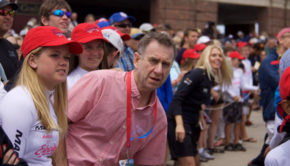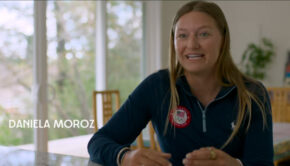Malcolm Page: Building a united system
Published on April 29th, 2019
Two-time Olympic Champion and seven-time World Champion Malcolm Page (AUS) is the Chief of Olympic Sailing, hired to lead the US national team and overall U.S. Olympic sailing effort. With Tokyo 2020 Olympic now just 15 months away, Scuttlebutt editor Craig Leweck checks in for an update.
You took on the role at the beginning of this Olympic quad. Now over two years in, are you pleased with the status of the program?
I had plans when I came in and I’m disappointed we are not further along. I had hoped we would have accelerated more. Maybe a little bit of that is down to naivete when you first come into a job, but at the same time, I think it’s a reflection of what we’re trying to build.
We’re setting up a system that whatever decision we make today, it’ll be good for the future as well. Of course, there’ll be times in the remaining half of the quad where we will have to focus to ensure that our medal chances for Tokyo 2020 are in place, but I want our progress and momentum to be able to roll to the next quad and beyond. I don’t want it to just be a one-shot-and-done scenario. We’re setting standards and culture that seek to prove the test of time.
I’m sure even the British athletes want more even though they’re in the most professional and successful sailing team in the world. And, of course, you can compare that to multiple others as well. So that’s human nature to always want more, but I want to make sure every step that we make here today will be good next quad and the quad after.
It’s one thing to hire coaches and create facilities, but changing habits and culture can take time.
Without a doubt, so my first priority is the athlete, though we don’t always get to choose the athlete. However, we do get to choose what we do around them, so I always say the first priority is getting a coach. Obviously, you want the world’s best coach, but it goes beyond that.
It takes the biggest expense away from the athlete because the coach is normally around 40% of your campaign costs. So if we can remove that expense, then you work to get all the teams to work together, and suddenly you’re getting efficiencies from a performance standpoint as well as a financial standpoint.
Additionally, it also is representation of leadership. It’s US Sailing leading these young talented athletes. When it’s the other way around, how is a 20-something-year-old expected to take on the might of all these other countries that have had quad after quad of experts guiding their athletes across multiple quads.
Our mission is to set up a structure so the talented youth athletes we witnessed at the 2018 Youth World Sailing Championship have the guidance and leadership to carry them along the pathway toward Olympic success.
But we have seen before youth success for the USA does not translate to Olympic success.
It is critical to develop a program that encourages the elite youth athlete to commit toward higher goals, and we’ve got to get all the stakeholders involved in this. We know in our sport that the young adult stage, that college age, is where it gets the most difficult for our participants. So we’ve got to get integration into the college system so we can start to skill the athletes through those years because education is super important.
No one is asking the athletes to give up that educational opportunity. To quote my old coach Victor Kovalenko, “I’ve never seen a stupid winner in our sport.” They’re always very super intelligent people. So I encourage education. I think it’s an integral part of success at the Olympics, let alone success in life, but we must integrate it with an Olympic plan.
And I understand that plan can prepare the athlete for when they’re done campaigning.
Indeed. We have an initiative to set up career mentorship to offer guidance and advice, and to work with our network to help these brilliant athletes that are also brilliant people who hold all the qualities that a workplace would want.
The US Team lacks government support, so it must rely on sponsors and private donors. I suspect the fundraising becomes easier when there is a comprehensive plan that instills confidence.
Absolutely. Not only does it build that confidence in the athlete, but also in their immediate support network of family and friends. That’s super important to have them believing that this pathway is possible.
Nothing happens fast, Tokyo 2020 is coming quick, and the view from the outside will be counting medals. What are you counting?
I know the measurement point will be the medal count in 2020. And I know that might sound scary, but I actually thrive on that sort of environment. It reminds me very much of my athlete days.
However, we can’t always choose the talent because the talent chooses to do the Olympic campaign, especially currently. This will change in the future, as the US program has made significant progress in youth development, but for now we focus on what we can control.
How can we best help these current athletes? What pleases me is how we have been able to promote unity amongst the sailors, getting them to work together. A great example is Paige Railey and Erika Reineke who are working together as two top-10 Radial boats in the world under one coach. Same with Caleb Paine and Luke Muller in the Finn.
We don’t have that luxury across all the classes, but wherever possible, we’ve been building that structure because it makes every session on the water that little bit more intense and educational. This translates to fostering better training towards the ultimate goal of success at the Games.
And that kind of culture of cooperation is something that gets carried on.
One of the areas of most promise, when I look at certain classes within the American fleets, is how the depth is huge. We have a 49er squad where they’ve already said, all of them, that they’re into 2028 and the 10-year plan. They’re all working together under one coach. So it’s really promising for where we’re going.
That’s been a past problem with the Americans as they haven’t always had a long view.
Correct. If we can build this mode of operation, USA will dominate at the 2028 Games. Sure, there’s other countries with just as much young talent as USA, but the quantity of that young talent is superior here, and the resources that are in this country are like no other. So if we can pull it together in a great united system, that’s when you’re going to see the benefits and see the USA return again as a dominant country in Olympic sailing.









 We’ll keep your information safe.
We’ll keep your information safe.